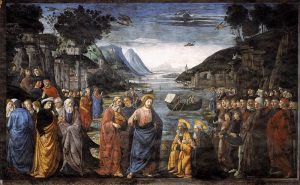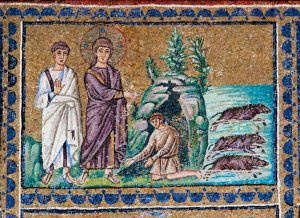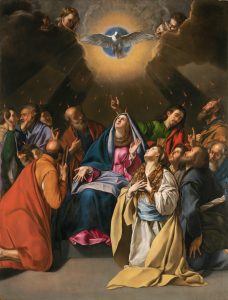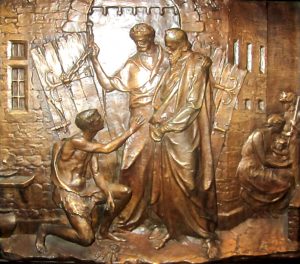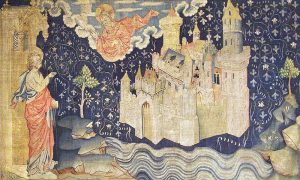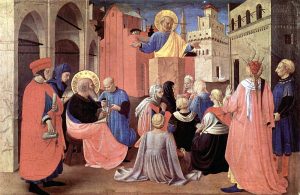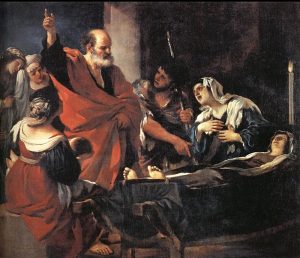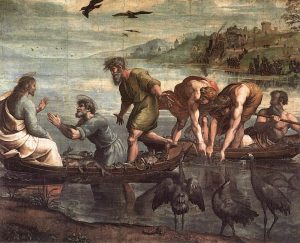Illuminations on the Lectionary readings for July 3, 2022 (Pentecost 4C)
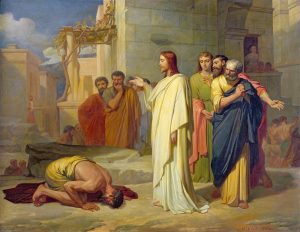
Jesus Healing a Leper (1864), Jean-Marie Melchior Doze (1827-1913). Musée des Beaux-Arts, Nîmes, France. (Click image to enlarge.)
First Reading (Track One): 2 Kings 5:1-14
No matter whether our lives are going well or things are going badly, trust in God. Trust, and be thankful for God’s blessings. This hopeful theme recurs through Sunday’s Lectionary readings. In our Track One first reading, Naaman, a proud commander of the Aramean army, risks going to Israel, an enemy nation, to visit the prophet Elisha, seeking a cure for his leprosy, a disfiguring disease that could render the sufferer unclean, cut off from his community. Elisha sent out a servant with advice that sounded too simple to be true: Go wash yourself in the Jordan River. Fortunately for Naaman, his servants came to the rescue again, calming his rage at Elisha’s disrespect. It couldn’t hurt to try, they advised him … and just like that, Naaman was cured.
First Reading (Track Two): Isaiah 66:10-14
Our Track Two first reading takes us to the final chapter of Isaiah. The people were filled with joy when they returned to their beloved city after the exile, but it lay in ruins. They faced the daunting labor of rebuilding the city and constructing a new temple. Still, the prophet declares, it was a time to rejoice and a time to heal. God will shower prosperity on the city, Isaiah declares; and, in beautiful language that imagines God as a loving mother, he tells them that God will nurse and carry the people as a mother comforts her child.
Psalm (Track One): Psalm 30
We can surely imagine the recovered Naaman singing this hymn of thanksgiving, which offers grateful thanks to God for recovery from a grave illness. The Psalm goes on to celebrate the gifts of God that may bring even more joy: ending the sadness and depression that so often accompanies illness … turning the weeping of those long dark hours of night into the celebration that comes at dawn … and turning the mourning of sickness into the dancing of health.
Psalm (Track Two): Psalm 66:1-8
Echoing the theme of trust in God’s protective power that we heard in the Isaiah reading, the Psalmist calls on all the earth to be joyful in God and sing the glory of God’s name. Recalling how God protected the people of Israel escaping slavery in Egypt by turning the sea into dry land, we sing out in full voice, making our voices heard in praise of the God who protects us.
Second Reading: Galatians 6:(1-6), 7-16
We now reach the end of Paul’s letter to the Christian community in Galatia in Asia Minor. Throughout this letter, Paul has consistently argued that Christ’s message is universal – for all humankind – Jew and Gentile, man and woman, slave and free. Writing from far away, he stood strongly, sometimes angrily, against the arguments of opponents who tried to persuade the Galatians to follow a more exclusive way. Paul’s final response clearly echoes Jesus’s message: “Bear one another’s burdens, and in this way you will fulfill the law of Christ.”
Gospel: Luke 10:1-11, 16-20
In last week’s Gospel, we saw Jesus beginning his final journey toward Jerusalem, setting his face in the direction of the cross and telling his disciples in no uncertain terms not to tarry. Now Jesus organizes an advance team of seventy witnesses to go on ahead, telling residents in villages along the way that the Kingdom of God has come near. Those who reject these messengers – like the Samarian villagers in last week’s Gospel – are rejecting Jesus; they deserve to be left behind like the dust shaken from the apostles’ feet. Those who welcome them are welcoming Jesus himself. Soon the disciples return, full of joy: In Jesus’s name, they say, they have healed the sick and even cast out demons.

